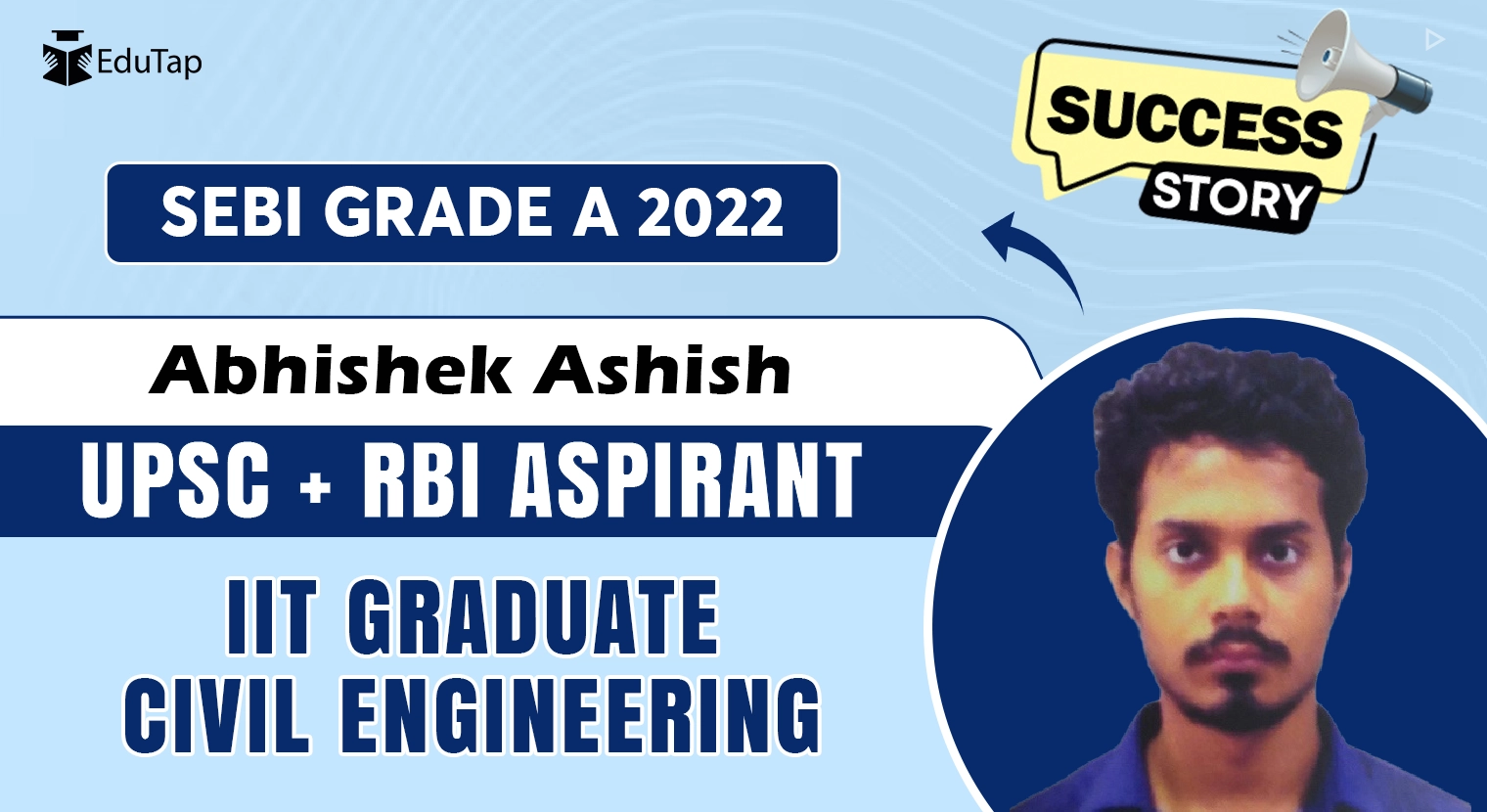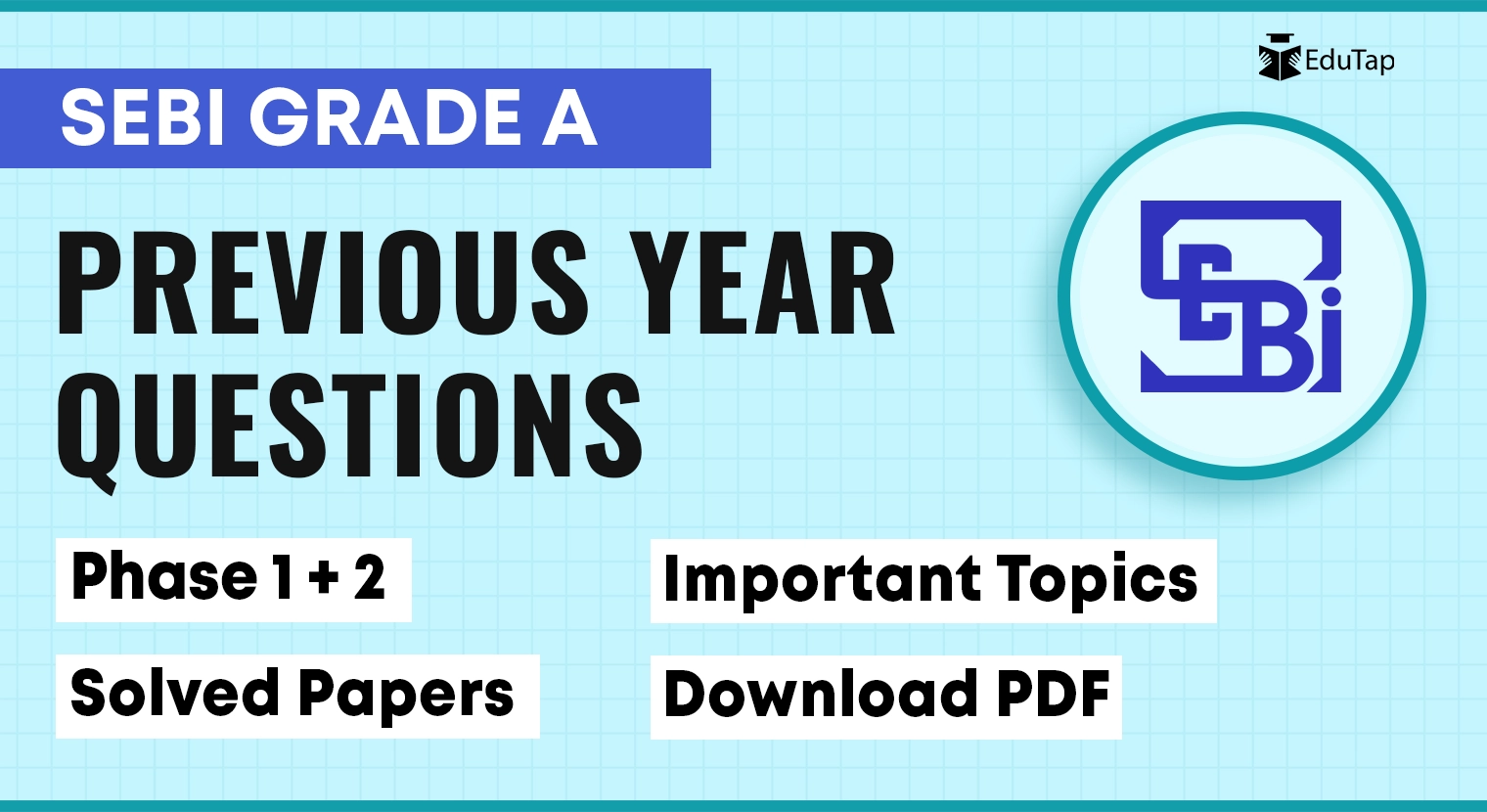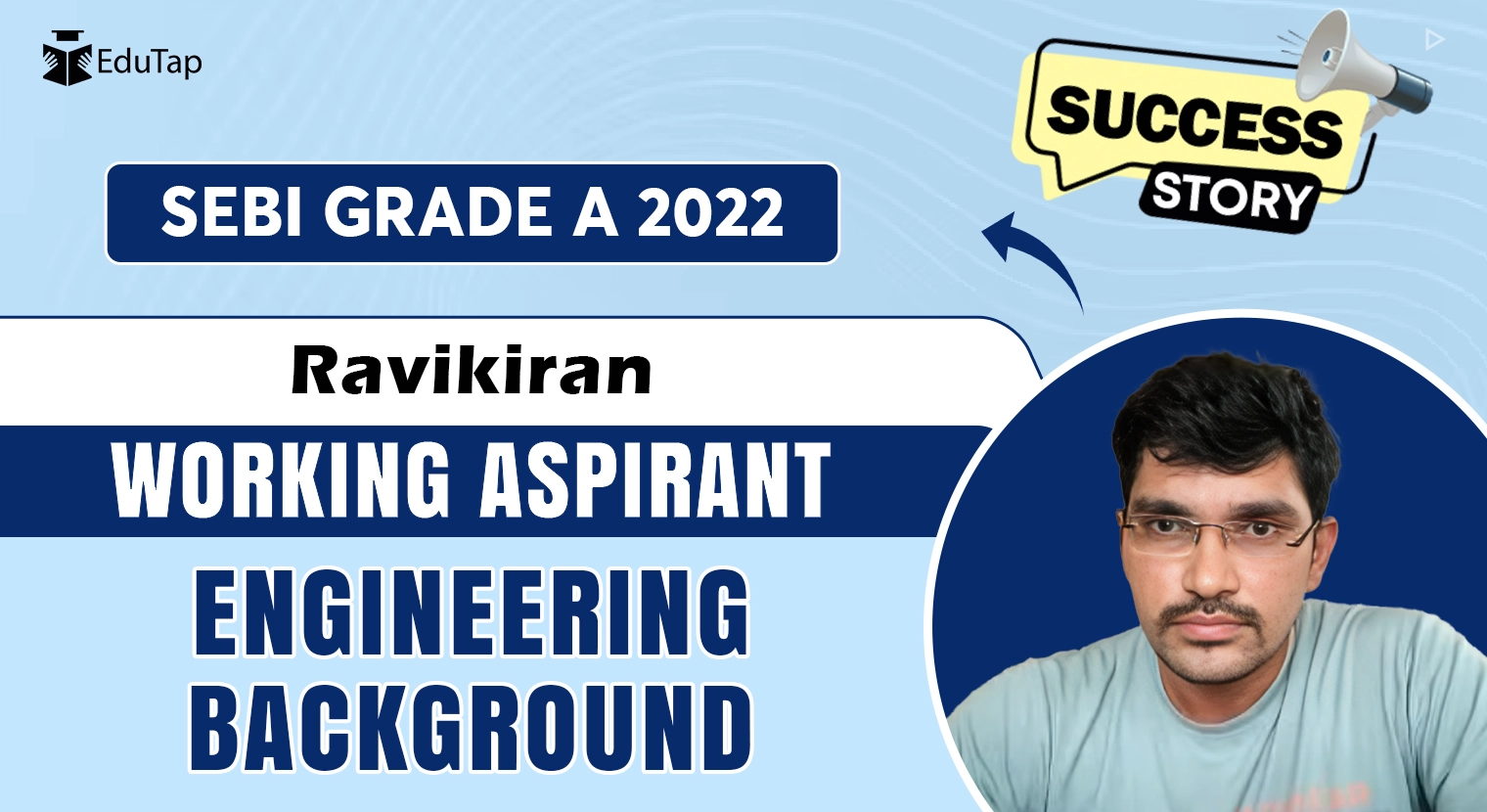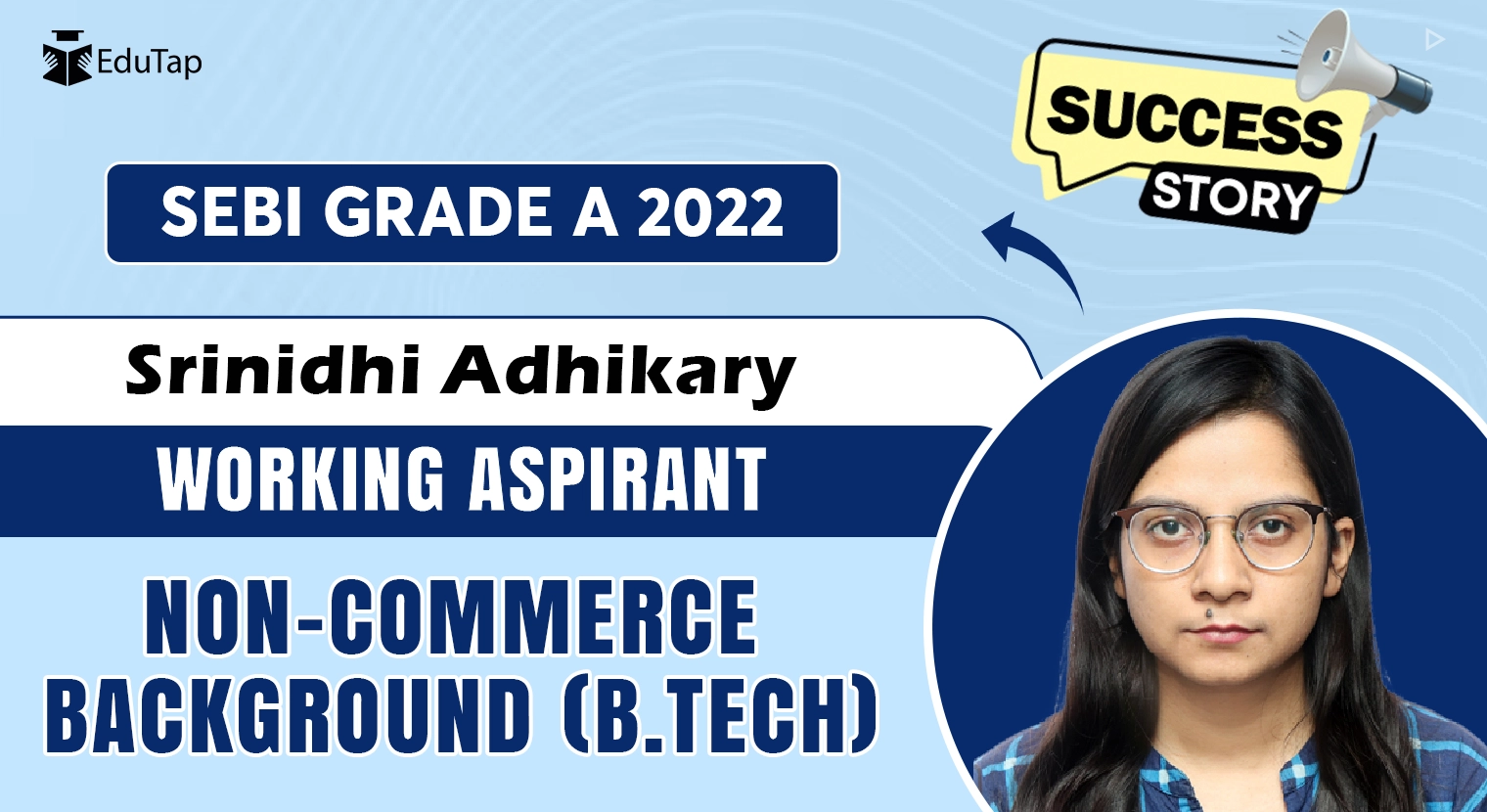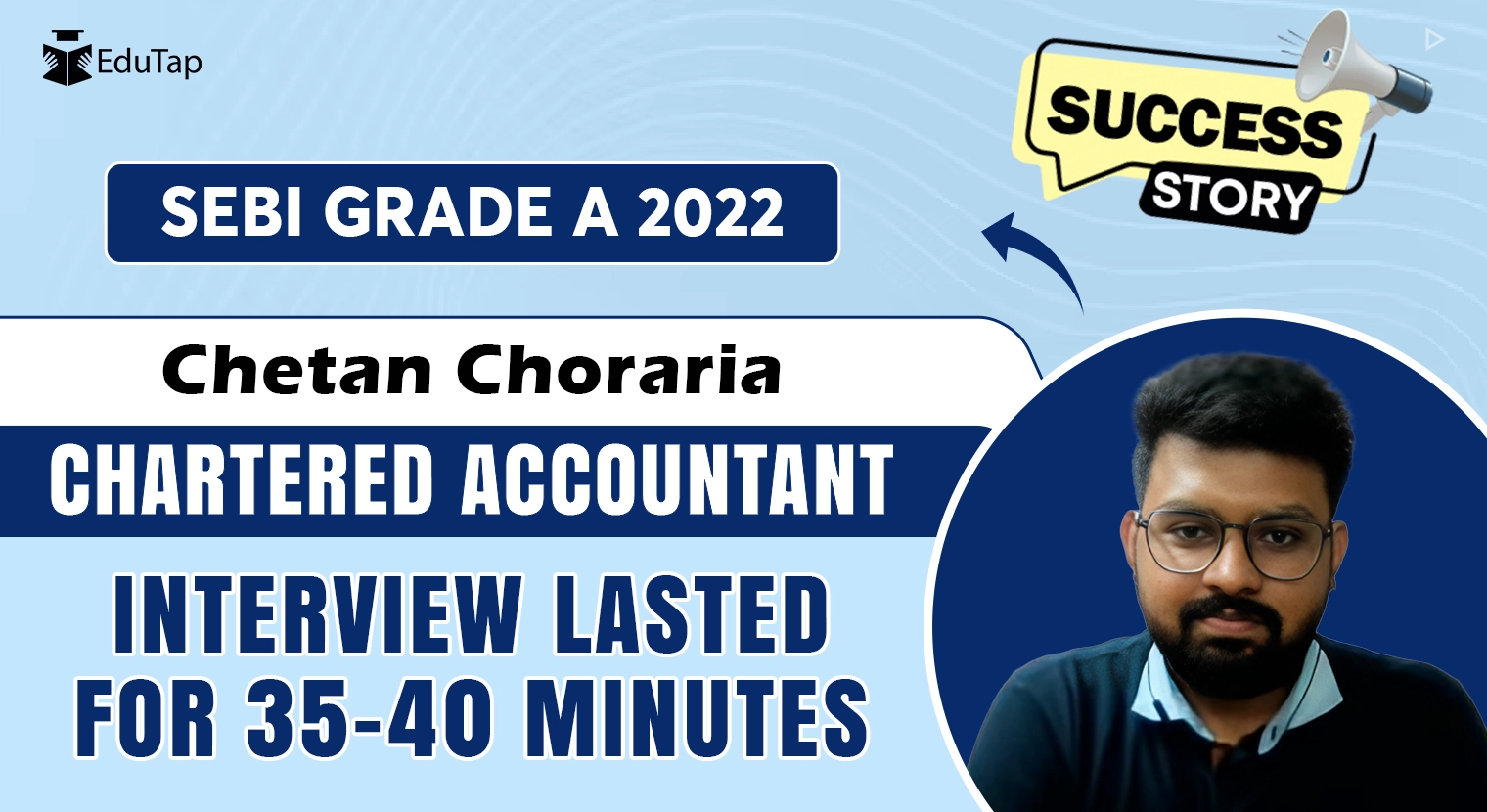Abhishek’s journey of cracking SEBI Grade A shows how careful planning and determination can pay off. With an engineering background and a job in the private sector, he decided to prepare for competitive government exams, spending two years on UPSC before focusing on SEBI.
From mastering maths to tackling new topics like commerce, his tailored strategies played a crucial role. Let’s explore his preparation journey which offers helpful tips for aspirants aiming for success in the SEBI Grade A exam.
Educational and Professional Details
Abhishek holds a Bachelor’s and Master’s Integrated degree in Civil Engineering from IIT Kharagpur. After graduation, he embarked on a two-and-a-half-year stint at L&T as an Assistant Manager. This experience instilled valuable managerial skills that proved beneficial during his SEBI preparation.
After working for a while at L&T, Abhishek decided to pursue a career in government services. He dedicated two and a half years to UPSC preparation. Though he wasn’t successful in securing a UPSC position within his decided 3-year timeframe, his interest in economics led him to explore Regulatary Bodies’ exams. He saw these exams as an opportunity to combine his engineering and economic knowledge. He cracked the SEBI Grade A exam in 2022 in his second attempt.
SEBI Grade A Phase 1 Paper 1 Strategy
Abhishek’s background in engineering gave him a significant advantage in SEBI Phase 1 Paper 1, which consists of four sections: Quantitative Aptitude, Reasoning, English, and General Awareness (current affairs).
Let’s look at his strategy for all these subjects.
Quantitative Aptitude, Reasoning, and English
Abhishek’s strong foundation in mathematics due to his engineering background made the Quant and Reasoning sections less challenging. He felt comfortable with the theoretical concepts and didn’t require extensive preparation. Additionally, his proficiency in English, honed through his education, made this section manageable.
Having attempted the exam previously, he was familiar with the format and question styles. This familiarity allowed him to approach QRE with confidence, avoiding the need for and in-depth study.
General Awareness
While Quant, Reasoning, and English were manageable, Abhishek understood the importance of General Awareness as well, for clearing the sectional cut-off of 30 marks. Although time-consuming, he dedicated three months to studying GA.
He didn’t create elaborate handwritten notes; instead, he took a more efficient approach. He focused on highlighting important information from printed monthly magazines provided by EduTap and other study materials.
This approach of targeted study allowed him to cover only key points and maximize his revision time. Interestingly, he didn’t attempt mock tests specifically for Quant, Reasoning, and English, or Paper 1 as a whole, relying completely on his existing knowledge and previous exam experience.
Abhishek acknowledges that commerce students might have an advantage in subjects like Commerce and Accounts, which are less familiar to engineering students. However, he highlights that engineering students often excel in QRE due to their strong analytical skills and mathematical background.

SEBI Grade A Phase 1 Paper 2 Strategy
Finance
- Leveraging Prior Preparation Experience: Abhishek’s past experience for the UPSC and RBI Grade B exams came in handy for the SEBI Grade A Finance section. He had prepared detailed notes on finance concepts starting in October 2020, which he revised throughout his SEBI preparation.
- RBI vs. SEBI Overlap: The overlap between RBI Grade B and SEBI Grade A finance sections was significant. Abhishek observed that while some chapters were unique to the RBI exam (like those focusing heavily on numericals), the core concepts were largely similar. He concluded that studying for RBI Grade B comprehensively helped cover most of the SEBI Grade A finance syllabus.
Management
- From Bulky Notes to Focused Revision: Abhishek initially relied on extensive management notes. However, after his first unsuccessful SEBI attempt, he revised his strategy. He re-did his notes into a concise 15-page document, focusing on key concepts and undertaking rote learning through repeated revisions.
- Application Approach vs. Rote Learning: The emphasis on application-based questions in SEBI exams, compared to the more rote-learning approach of the RBI exam, influenced Abhishek’s management preparation. He highlighted that SEBI tested a deeper understanding of management principles rather than straightforward memorization.
During preparation, Abhishek emphasized the importance of practicing a large number of questions. He utilized EduTap’s 5000 MCQ course for SEBI, alongside studying relevant regulations. By solving numerous questions, he identified his weaknesses and revised specific areas more thoroughly.
Companies Act
Companies Act was an entirely new subject area for Abhishek. This subject wasn’t covered in the RBI syllabus or his engineering education. His approach? Note-taking, but with a personalised strategy!
Abhishek took a two-way note-taking strategy, both physical and digital notes. He started by creating comprehensive handwritten notes, which you may call “rough drafts.” Then, he used these notes to develop concise, digital versions that were easier to revise. This method allowed him to leverage the benefits of both traditional and digital note-taking:
- Physical notes helped facilitate the organization of information as a first step.
- Digital versions allowed for quick revision and easy identification of areas needing further exploration.
- When a digital note lacked clarity, Abhishek revisited the corresponding physical notes for deeper understanding.
Companies Act can be overwhelming, with penalties, regulations, and various acts. However, Abhishek’s note-taking strategy helped him navigate this complex subject easily.
He summarised the essential details, including penalties and relevant act sections, into a manageable 2.5-page document. This concise document, refined through a double-filtering process (extensive initial notes followed by a condensed digital version), became his go-to resource for revision.
Commerce and Accountancy
Commerce and Accountancy, another unfamiliar territory for Abhishek as an engineering student, presented a significant challenge. However, he effectively tackled this hurdle through the EduTap course.
The structured approach of the EduTap course proved crucial in Abhishek’s success. The course’s gradual progression, starting with building fundamental accounting concepts and progressively increasing in complexity, allowed him to grasp the material effectively.
Abhishek followed the EduTap course in its entirety, following the given sequence. This ensured a comprehensive understanding of all relevant topics. Furthermore, the course offered a valuable combination of learning methods:
- Video Lectures: The visual format enhanced comprehension and helped build knowledge retention.
- Written Materials: Abhishek mentioned powerpoint slides that were part of the course helped him complement the video lectures.
- Quizzes: Interactive MCQs after every topic allowed Abhishek to test his understanding and identify areas needing additional focus. This self-assessment element ensured he wasn’t simply passively consuming information.
Abhishek mentioned that some students might feel overwhelmed by the sheer volume of material in online courses. However, he found the EduTap course to be comprehensive and manageable.
Costing
Costing posed a unique challenge for Abhishek. He recognized that costing involved more numerical problems compared to accounts. Here’s how he tackled this problem:
- Pausing Video Lectures to Practice: Abhishek adopted an active learning approach while watching video lectures on costing. Whenever a numerical appeared, he would pause the video and attempt to solve it independently. Only if he encountered difficulty would he resume the lecture for guidance.
- Emphasis on Self-Practice: During his second revision, Abhishek took his learning a step further. He would revisit costing lecture presentations and solve the problems again without referring to the video explanations.
- Time Management: While Abhishek didn’t specify a standard time per video, he acknowledged that solving the costing problems took more time during study sessions. For example, he might allocate two hours for a lecture, but the problem-solving process would sometimes stretch it to four hours.
Economics
Abhishek’s background in UPSC preparation provided a foundation in economics, but it wasn’t a direct match to SEBI exam requirements. Here’s why:
- Theory vs. Application: The UPSC exam emphasizes theoretical economic concepts and their broader implications. In contrast, the SEBI exam focuses on the practical application of economic principles within the financial regulatory framework. For example, concepts like the nitty-gritty of classical economic theories, supply and demand of money, etc., are less prominent in the UPSC syllabus.
- Starting from Scratch: The specific requirements of SEBI Grade A exam meant he couldn’t simply rely on his existing knowledge. He essentially had to approach the subject from a beginner’s perspective, delving deeper into the practical applications relevant to the SEBI domain.
It is important to note that while a background in economics can be beneficial, it’s crucial to understand the exam trends of how a specific subject is tested in SEBI particularly. Additionally, building a strategy based on your strengths and weaknesses is equally important.
SEBI Grade A Phase 2 Paper 1 Strategy
Descriptive English
Abhishek’s experience with the UPSC exam prepared him for the general aspects of writing, but the SEBI Grade A Phase 2 Paper 1 demanded a different approach. Nevertheless, his experience preparing for UPSC, RBI Grade B, and his thesis writing for his Masters degree contributed to his typing speed and overall writing comfort.
- Focus on Conciseness: Unlike the UPSC’s essay-oriented format, SEBI’s descriptive writing required concise answers within a 200-word limit. Abhishek acknowledged this shift and adjusted his strategy accordingly.
- Short Notes for Topic Revision: While the UPSC exam includes diverse topics, SEBI focuses on subjects relevant to the financial sector. To strengthen his answers, Abhishek created short notes containing data points related to finance, information technology, and other SEBI-related areas. He revised these notes just before the exam to ensure they were fresh in his mind.
- Current Affairs as Inspiration: Abhishek, though not a daily newspaper reader, dedicated four to five days a week to reading The Indian Express and The Economic Times. This exposure to current events provided him with relevant information to substantiate his arguments in the descriptive answers.
- Essay Writing Practice: Unlike some toppers who practiced dozens of essays, Abhishek’s focus was more measured. He practiced around ten essays in the week leading up to the exam, ensuring his writing remained sharp.
- Targeted Practice for Precis Writing: While he didn’t practice reading comprehension specifically, Abhishek recognized the importance of precis writing within the English paper. He developed this skill by selecting articles from The Indian Express and summarising them concisely.
Abhishek acknowledged the subjective nature of English marking and the element of luck that can sometimes play a role. He scored higher in the RBI exam’s descriptive section (without dedicated preparation) compared to SEBI, highlighting the potential for variability.
Abhishek emphasizes the importance of dedicating the last 10 minutes of the exam to revising your written answers. This allows you to identify and rectify any grammatical errors, missing articles, or misplaced conjunctions. This strategy, often overlooked, can significantly improve your score.

SEBI Grade A Phase 2 Paper 2 Strategy
Abhishek followed a holistic approach for Paper 2 preparation for both Phase 1 and Phase 2. Following are the details of how he built on his Phase 1 preparation.
Finance
- Took Advantage of RBI Preparation: Abhishek’s strong foundation in finance from his RBI exam preparation proved advantageous. Since SEBI can be seen as a subset of RBI finance, a significant portion of the syllabus was already covered.
- Focused on Understanding Concepts: The emphasis was on comprehending core financial concepts. Even if formulas were forgotten, basic calculations could be solved by analyzing the numbers and answer choices.
- MCQ Practice: The 5000 MCQ course, while containing some repetition, offered valuable practice in applying financial concepts and identifying areas needing further focus. It wasn’t perceived as a burden but rather an engaging exercise.
Management
- Short Notes for Core Concepts: Abhishek created concise notes to solidify his grasp of fundamental management principles.
- Application-Based Approach: Fortunately, the paper heavily emphasized applying management knowledge to real-world scenarios. Abhishek’s focus on core concepts allowed him to answer these questions smartly.
Companies Act
Here’s a breakdown of Abhishek’s suggestions for those new to Company Law:
- Don’t Rely Solely on PYQs: While past papers (PYQs) are valuable, Abhishek highlights that the format can change, as compared to Phase 1. A focus on understanding the underlying principles of company law allows you to adapt to different question styles.
- Start with EduTap Lectures (Optional): For beginners with a non-legal background (like Abhishek’s engineering background), introductory video lectures from EduTap can provide a foundational understanding. The provided presentations in the course can help translate complex legal concepts into easier-to-grasp visuals.
- Transition to the Companies Act: After gaining a basic understanding through lectures and presentations, it’s crucial to refer to the original Companies Act. This allows you to grasp the legal intent behind specific sections and avoid misinterpretations. However, be aware that the penalties can be overwhelming for newcomers.
Costing
Abhishek went beyond the resources provided by EduTap. He actively sought out additional practice questions online through free mock tests and other platforms. This exposure to various question formats and difficulty levels strengthened his problem-solving abilities.
Abhishek also participated in EduTap’s All India Mock Tests, consistently ranking within the top 9 percentile. While he acknowledges that mock test scores may not directly translate to final exam results, they provide valuable insights into your strengths and weaknesses compared to other aspirants.
Commerce and Accountancy
Abhishek recognized the importance of mastering the fundamentals for Phase 2. He began with practicing basic journal entries, even though they weren’t pin-pointed in the syllabus. By understanding these core concepts, he was able to grasp more complex accounting principles later.
He also emphasized that a solid understanding of journal entries is the foundation of accounting. Being comfortable creating these entries allows one to effortlessly move on to ledgers, trial balances, and final accounts.
Economics
Recognizing the increased competition in Phase 2 along with his weaknesses, Abhishek dedicated 30-40% of his Phase 2 preparation time specifically to Economics. This targeted focus ensured he wasn’t caught off guard by any new or unfamiliar concepts.
Interview
Interview Preparation
- Natural Approach: Abhishek learned from his experience with the RBI exam, where feeling stressed out had negatively impacted his performance. This time, he decided to be his natural self during the interview. He believed that genuine responses would be more convincing than practiced answers.
- Preparation Focus: While Abhishek prepared some HR questions, he prioritized honesty over scripted responses. For the technical aspects, he reviewed relevant materials.
Final Interview Experience
- Panel: The interview panel consisted of four members, with one participating virtually.
- Technical Questions: The panel focused heavily on technical aspects, including his engineering background and certifications. They even delved into topics beyond the official syllabus of his degree.
- Confidence and Honesty: Abhishek maintained his composure and honestly admitted when he wasn’t familiar with a particular topic. He avoided simply saying “no” to every question but politely explained his limitations.
Abhishek believes the panel’s technical focus stemmed from his engineering background, highlighting the importance of tailoring questions based on the candidate’s profile.
You can listen to Abhishek’s journey in his own words in the following video.
Message for Aspirants
If you’re facing time limitations and need to prioritize your SEBI Grade A studies, here’s some advice based on Abhishek’s experience:
- Question Skimming and Prioritization: In the exam, Abhishek quickly scanned the questions to identify those he could answer confidently. These were tackled first, maximizing his score on familiar topics. He would later revisit the remaining difficult questions, saving time.
- Daily Study with Consistency: Abhishek prioritized his studies, taking out dedicated time for studying each day. This consistency was key to his success.
- Focus on Strengths: Abhishek concentrated on his stronger areas, particularly Costing and Accounts. He had thoroughly prepared for these subjects and revised them strategically using his condensed notes. By focusing his efforts on these sections, he ensured he crossed the Phase 1 cut-off comfortably.
- Holistic Review: When revising with limited time, Abhishek revisited his comprehensive notes first. This refreshed his overall understanding before diving deeper into specific topics using his filtered, condensed notes.
- Back to the Source: If you haven’t reviewed your core study materials in a while, consider revisiting them for a holistic refresh. This can reignite your understanding and identify areas needing additional focus.
- Strategic Skipping: Abhishek acknowledges that Phase 1 serves as a qualifying round. He took a calculated risk by strategically skipping the Economics section entirely during his Phase 1 preparation. Since he had studied economics for UPSC the previous year, he felt confident answering basic questions based on his long-term memory. This allowed him to focus his limited time on other sections.
Important Note: This approach to skip sections is risky and may not be suitable for everyone. A weak performance in other sections could leave you vulnerable if you underestimate the Economics portion. It’s crucial to assess your strengths and weaknesses realistically before adopting such a strategy.
Aspiring candidates embarking on their SEBI Grade A journey can draw inspiration from Abhishek’s success story and adopt a comprehensive approach to preparation. From creating revision notes to utilizing online courses effectively, the key lies in understanding individual strengths and weaknesses while dedicating sufficient time to master concepts!
